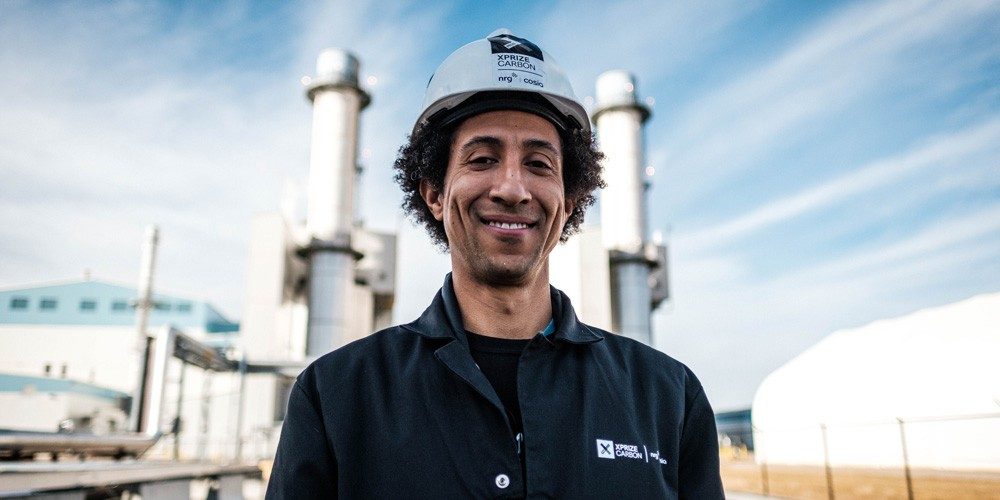Chemistry in Person: The Power of a Prize
By Max G. Levy | April 2022

MARCIUS EXTAVOUR
B.S.: Applied Science & Engineering; University of Toronto
M.S.: Atomic Physics & Quantum Optics; University of Toronto Ph.D.: Atomic Physics & Quantum Optics; University of Toronto
WHAT HE DOES NOW: Vice President, Energy & Climate at XPRIZE
Ever since he was a kid, Marcius Extavour loved imagining new worlds. The trumpet-playing, lego-loving bookworm found sci-fi to be an escape. But his desire to escape didn’t come from a place of gloom—it was a rich source of optimism.
“I liked the idea of thinking about a deep future, where humanity has solved a lot of the problems that ail us,” Extavour says. “Because I fundamentally believe most of the problems that plague us are solvable.”
Extavour’s passion for unanswered problems took him to the University of Toronto for undergraduate and graduate degrees in engineering and atomic physics. Energy problems interested him the most. He bounced between different careers, while piecing together what his ideal career should look like. He wrote software for a utility company. He worked on Capitol Hill as a science policy advisor. He helped create ambitious proposals for large university projects. Then, he got an opportunity to work at XPRIZE, where he is now vice president of energy and climate.
XPRIZE is a nonprofit that holds competitions for innovations intended to benefit humanity. Their inaugural prize-winner, SpaceShipOne, performed the first private crewed space flight in 2004.
Today, the prizes up for grabs include $15 million for the best sustainable protein to replace chicken or fish and $100 million for the best carbon dioxide removal tech. Extavour’s role is to work closely with funders to decide monetary prizes and to build communities of experts that provide guidance. His recent CO2-conversion competition assessed teams’ business plans and lab results, and hosted demos at real power plants.
For an optimist passionate about the world’s biggest challenges, XPRIZE is a perfect fit. His team draws inspiration from a 1919 contest called the Orteig Prize. A New York Hotel owner named Raymond Orteig had offered $25,000 (about $400,000 today) to the first pilot to fly nonstop between New York and Paris.
“This was considered crazy, because airplanes were not used in that way at the time at all,” Extavour says. Planes were used for local trips or war. But pilots took on the challenge and, in 1927, Charles Lindbergh piloted the first nonstop solo flight from New York to Paris. “It’s a fun story, because he was the least experienced pilot, the press thought he was a joke at the time, but he ended up winning,” Extavour says. That flight pushed the limits of how people think about airplanes, and it helped connect the world as a result.
Through his work, Extavour hopes to push energy and climate technology to new levels, so that everyone around the world can use lights, refrigeration, cooling, and heating in their homes.
This interview was edited for length and clarity.
What makes contests so motivating?
I personally just like competing. I like games. And I think it’s fun to compete in groups. My favorite part about school was being told, “Go work with your friends on a project you think is fun. And come back in a few weeks.” This is like, the greatest thing.
Why do you think incentives like XPRIZE’s work?
Prizes can unlock something in people. There’s a way in which competition can actually foster collaboration, and just to help focus people’s minds on the topic.
What moments make you think: “I love what I do”?
I really get a lot of satisfaction by communicating a thing to someone else that makes them go, “You know, I never thought about it that way.” I love that. And I get to do that in my job. I love the idea of helping a community organize, because innovation is a very messy thing. It’s a creative thing. And creative things are not formulaic.
Why was Lindbergh’s flight so inspiring?
He didn’t invent the airplane. He didn’t invent a new engine. He didn’t invent any flying techniques. But he proved that something that everyone thought was not possible was doable. And the effect of that was people saw aviation in a new way. That’s a cool idea because it isn’t just a technological innovation—it’s a mind shift.
What would be a similar shift in the realm of energy?
The energy world is dominated by discussions of trade-offs that affect cost, the environment, and society. I would love to get to a new sort of conscious plateau where we think of the idea that abundant low-cost and safe energy access for every person on earth is completely doable. So then, the conversation shifts to: How do we do it?



